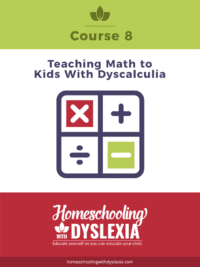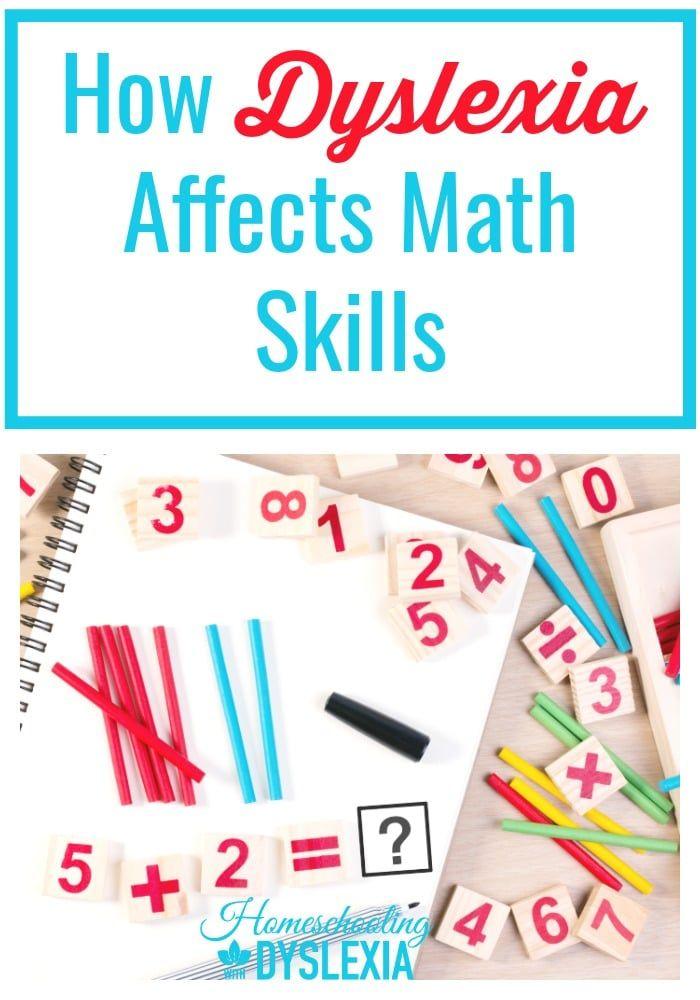Imagine my joy at discovering that my kids were a part of the 20-60% of kids with dyslexia who also have dyscalculia! Now alongside teaching struggling readers, I’m teaching kids who struggle with math as well. Sigh…
The longer I teach my kids with dyslexia, the more I learn about the complexities of this brain-based condition and its impact on how my kids learn.
It’s really no surprise that many kids with dyslexia also struggle with:
The Link Between Dyslexia and Dyscalculia
4 Underlying Areas of Weakness
Students with dyslexia, dysgraphia, and dyscalculia all have underlying weaknesses in the same areas:
- auditory processing: how their brains process auditory information
- visual processing: how their brains process visual information
- working memory: how their brains remember information
- executive function: how their brains organize information
Understanding How Processing Issues Affect Learning
Typically, students with slow processing speeds (either visual or auditory processing) lack the underlying perceptual and associative processing tools that enable them to efficiently process numbers and math.
In essence, processing means information in, information out.
For example, how we:
- receive information,
- make sense of it,
- store it,
- retrieve it
These processing ‘tools’ help us to express what we know.
If mathematical processing skills are not developed, then it appears as if we do not know the math. So while our kids may have perfect vision and hearing, once the information enters the brain through the eyes or ears, things get messy and the information doesn’t quickly and efficiently go where it needs to go.
Learn more about Visual Processing here.
Learn more about Auditory Processing here.

How Working Memory Weakness Affects Math and Reading
Working memory refers to the brain processes used for temporary storage and use of information and affects our ability to remember instructions and recall rules such as in games, reading, or math.
It is similar to processing as in the previous example but involves manipulating the information that is being taken in as well – therefore the term ‘working’ memory.
Working Memory operates over only a few seconds, and it allows us to focus our attention, resist distractions, and guide our decision-making.
Doing math in “your head,” or mental math, requires significant amounts of working memory. Children need to store the information, hold it in mind for the time necessary to use it, retrieve the math facts that they have presumably learned, and then process the information.
Consider doing a math word problem in which one needs to keep in mind all of the facts that they have just heard, engage in calculations, and then recall additional math facts in order to arrive at a solution
Example problem: There were 1768 cars in the convention center parking lot. Half of the cars left after an afternoon concert and 1020 more cars came in for the evening show. How many cars were there before the evening show let out?
Word problems can be particularly difficult. Our kids may know how to do different kinds of calculations. However, many kids can run into trouble with word problems. It’s difficult to listen for clue words that indicate which operation to use, while at the same time remembering the numbers that need to be plugged into the equation.
Low working memory causes problems with the efficient learning of both calculations and higher level problem-solving.
Research shows that the most common deficit among all students with dyscalculia, with or without co-occurring dyslexia, is their difficulty in performing on working memory tasks.
Learn more about Working Memory and How it Affects Learning.

Understanding Executive Function Weaknesses
Executive function refers to the network of the brain that is responsible for planning, organizing, prioritizing, and recognizing errors and also involves working memory.
Executive functioning issues can produce a wide range of symptoms. Depending on which skills your child struggles with the most, and the particular task he or she is doing, you might see the following signs:
- Finds it hard to figure out how to get started on a task
- Can focus on small details or the overall picture, but not both at the same time
- Has trouble figuring out how much time a task requires
- Does things either quickly and messily or slowly and incompletely
- Finds it hard to incorporate feedback into work or an activity
- Sticks with a plan, even when it’s clear that the plan isn’t working
- Has trouble paying attention and is easily distracted
- Loses a train of thought when interrupted
- Needs to be told the directions many times
- Has trouble making decisions
- Has a tough time switching gears from one activity to another
- Doesn’t always have the words to explain something in detail
- Needs help processing what something feels/sounds/looks like
- Isn’t able to think about or do more than one thing at a time
- Remembers information better using cues, abbreviations or acronyms
Learn more about Executive Function and how it Affects Learning here.
That’s nice, but now what?
Knowing about these co-existing weaknesses helps us to understand the bigger picture when it comes to these outside-the-box thinkers of ours, doesn’t it? We can’t fix the problem unless we know what’s broken.
If you’ve been around this site for long, you know that I don’t for one second think that our kids are broken. To the contrary, I believe that our kids (and husbands or wives) have been created this way for a purpose – for great purpose. See all of these dyslexia success stories.
The reality is though that we need to teach these guys how to read and write and do math. When parents take the time to learn how their kids learn (and don’t learn) they are better able to teach their kids.
Teaching Math to Kids With Dyscalculia

Take a class. Teaching Math to Kids With Dyscalculia is a one-hour, online, parent class full of the latest research and tons of effective teaching tips for kids who struggle with math.
Or learn more about the underlying weaknesses that affect reading and math in our new parent course bundle:

How about you? Do your kids struggle with math?







I signed up so I can know when your parenting class/book goes live. My son (4th gr this year) has had a very hard time with math this year. He understands the concepts of division and multiplication but because he has no memory of multiples except 10s and 2s, and the math only getting harder, I feel he is further behind…and he hates math. We play lots of games which he enjoys and I’m trying to think out of the box as far as how we can learn those math facts (his sister did Times Tales with great success, but he sees this as a ‘little kid’ show, and just has no motivation to do it–doesn’t care at all. I’m stuck between forcing it and just giving up daily. It’s draining. I’ve recently started to let him just use a calculator with things like story problems, etc. because it makes our math time go so much better. I feel compelled to learn more about this (he doesn’t have a formal diagnosis but is on an iep) because this year has just been so much harder than the rest re: math. Sigh. Thank you for your resources, and information.
My daughter has not been formally diagnosed as dyslexic but her challenges and learning style seems to tick a lot of the boxes. We have found that this year (grade 4) has been both the most challenging and the most rewarding: in the first semester it seemed like she was drowning. It didn’t matter how much extra practice we put in or what creative methods we tried, she was struggling. But the second semester is going so much better- she seems to have a handle on math and is reading more fluently. She is more organized and is recalling spelling words at a much better pace than I anticipated. I would really appreciate your insight: does that mean we have turned a corner or do children peak and plateau?
I was curious how common dyslexia with dyscalulia is and this piece came up in my google search. It’s strange seeing this situation flipped on it’s head. My mother is severely dyslexic, but wasn’t tested until I was tested as a child. My sister has severe dyslexia and was tested as a child. I was assessed as having auditory processing disorder, as per the tests available at the time. As an adult, I required reassessment and was diagnosed with moderate dyslexia and moderate dyscalculia.
I have kids in school and I worried and worried about them having learning disabilities. I was ready when they were learning to read and when they got to addition and subtraction. Only, they learned to read seemingly in the blink of an eye and they figure out mental math as easily as any other child. I expected learning disabilities only, my kids don’t have them.
I hadn’t thought about how it must be for mother’s who didn’t grow up with LD’s and being thrown into the LD childhood. But it’s also a childhood of learning resilience. It’s been a major strength in the workplace. When others shyed away from risk and failure, I was right there and ready to keep plowing through negotiations. ‘They aren’t going to agree to that. Instead of adding more and more to this deal until we’re doing this at a loss, let’s take all of that off the table and figure out what it is they want, that they don’t know they want yet.’ For all the difficulty kids with LD’s go through, we do have strengths. Strengths that are hard to identify in an academic setting, but were obvious to me in a corporate setting.
“But it’s also a childhood of learning resilience. It’s been a major strength in the workplace. When others shied away from risk and failure, I was right there and ready to keep plowing through negotiations.” I LOVE your observation and I find it to be very true with my dyslexic husband as well. His ability to take risks in business has made a huge impact on his success.
Great article! Our son has dyslexia & dyscalculia, plus some Asperger’s and ‘global development delay’. My wife (his Mum) passed away 5 years ago, so I picked up homeschooling he and his younger sister. (The oldest escaped to work, then University. :-))
He reads fairly well (although not out loud, as he struggles with decoding), choosing non-fiction almost exclusively. He has a friendly open personality, a helpful attitude, and gets on well with everyone. And he has an awesome memory/recall for so many things. He will watch and re-watch, listen to and re-listen to things over and over again.
I’ve done my best, but the reality is that some things he simply cannot do. Or, at least, can’t do consistently. He’s now 19, and I’m still homeschooling him – as much to give him something to do as anything.
In spite of putting a number of systems in place, I have to remind him about even regular tasks quite often. If I ask for more than one thing to be done at a time, I can be pretty sure to find one of them gets missed (if not more). I.e. he pretty much needs to be micro-managed.
So, I’m still trying to figure out what kind of work he can do. I’ve been an employer, so I know employment may be hard to find/keep. Meanwhile I’ve been setting up a business to generate an income (but not one that he can work in, as it’s online training).
Meanwhile, I’ve been blessed to find a new wife, and she understands him. She’s an early childhood teacher, and has come across many with similar issues. In fact, her niece is very similar.
That’s my personal rant. But I just want to say one further thing – just because he, or your loved one can’t do something, doesn’t make them any less a person. They will have abilities (yes, maybe hard to find) that others do not. And, you know, those things they maybe can’t do – are they really that important?
Oh, and I believe it is because we chose to homeschool him that my son is still emotionally intact.